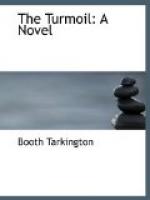CHAPTER XV
Mary was the picture of a lady flustered. She stood with one hand closing the gate behind her, and she had turned to go in the direction Bibbs was walking. There appeared to be nothing for it but that they should walk together, at least as far as the New House. But Bibbs had paused in his slow stride, and there elapsed an instant before either spoke or moved—it was no longer than that, and yet it sufficed for each to seem to say, by look and attitude, “Why, it’s you!”
Then they both spoke at once, each hurriedly pronouncing the other’s name as if about to deliver a message of importance. Then both came to a stop simultaneously, but Bibbs made a heroic effort, and as they began to walk on together he contrived to find his voice.
“I—I—hate a frozen fish myself,” he said. “I think three miles was too long for you to put up with one.”
“Good gracious!” she cried, turning to him a glowing face from which restraint and embarrassment had suddenly fled. “Mr. Sheridan, you’re lovely to put it that way. But it’s always the girl’s place to say it’s turning cooler! I ought to have been the one to show that we didn’t know each other well enough not to say something! It was an imposition for me to have made you bring me home, and after I went into the house I decided I should have walked. Besides, it wasn’t three miles to the car-line. I never thought of it!”
“No,” said Bibbs, earnestly. “I didn’t, either. I might have said something if I’d thought of anything. I’m talking now, though; I must remember that, and not worry about it later. I think I’m talking, though it doesn’t sound intelligent even to me. I made up my mind that if I ever met you again I’d turn on my voice and keep it going, no mater what it said. I—”
She interrupted him with laughter, and Mary Vertrees’s laugh was one which Bibbs’s father had declared, after the house-warming, “a cripple would crawl five miles to hear.” And at the merry lilting of it Bibbs’s father’s son took heart to forget some of his trepidation. “I’ll be any kind of idiot,” he said, “if you’ll laugh at me some more. It won’t be difficult for me.”
She did; and Bibbs’s cheeks showed a little actual color, which Mary perceived. It recalled to her, by contrast, her careless and irritated description of him to her mother just after she had seen him for the first time. “Rather tragic and altogether impossible.” It seemed to her now that she must have been blind.
They had passed the New House without either of them showing—or possessing—any consciousness that it had been the destination of one of them.




